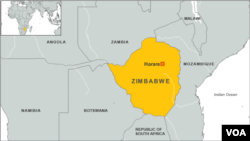People with disabilities say economic and political empowerment is important because it enables them to live productive and dignified lives.
Thirty-four year old Masimba Kuchera is visually-impaired and walks with the aid of a white cane. Kuchera, who runs his own company in Harare, says there is need for legislation to reward companies that employ people with disabilities.
“The government should give tax incentives to companies so that they employ a certain quota of people with disabilities so that those people are able to contribute to the economy and pay the other taxes that are available.”
Kuchera says there should also be legislation to ensure government gives a certain quota of supply contracts to companies run by persons with disabilities.
His views are shared by Nigel Gweshe, a visually impaired music producer from Bulawayo, who says people with disabilities should be assisted to become employers through the enactment of pro-disability policies.
He says this is in line with the United Nations Convention on the Rights of People with Disabilities, which calls for their active participation in human, social and economic development of society.
“Most of the help that is given to the disabled is food and shelter. We need a kick-start whereby you will be given materials or inputs to do your own things, to create employment like my studio I will be employing and recording artists as well.”
FUNDING
Forty-four year old Tongai Chinhaire is also visually-impaired. The father of three makes a living through vending on the streets of Harare. He says there is need for policies that encourage funding for individuals with disabilities.
“Currently the economy is down. If I am being given the unemployment benefit blind people can start from there. For example, one can go and buy and sell products, he will start from there. Remember a small leak sinks a big ship. So whatever I get from you I will be in a position to do something.”
According to Harare provincial administrator Alfred Tome, there are policies that take care of people with disabilities but a lot needs to be done at the level of implementation.
“We have created the constitution, but what is left is to translate that into reality and us leaders should be honest with ourselves. We should be patriotic and concerned about people living with disabilities. We need to walk the talk.”
Senator Nyamayabo Mashavakure, who represents people with disabilities in the Senate, argues that disabled people should involve themselves in all activities at national and local level if society is to take them seriously. He was addressing a recent meeting in Harare for people with disabilities.
“Include yourselves, empower yourselves, make yourself accessible to society, to national budgeting, to national programming. Specialise in yourself. Study yourself, represent yourself advocate your own concerns and your own issues.”
EMPOWERMENT LAWS
Twenty-one year old Fungai Mutoko, who walks with the aid of crutches, recently completed her Ordinary Level studies in Zimbabwe. She says parliament should come up with laws that empower women with disabilities and also change public perception of such people.
“We won’t be seen as beggars because most people with disabilities walk the streets begging for money. If we start our own things we get respect because people don’t really like to see you begging every day.”
Aspiring actress, Nozipho Thusi, says parliament should seriously debate the plight of women with disabilities and ensure that measures are put in place to improve their livelihood.
“Yes they have different talents, but they need someone who can empower them. If they have capital they can do sewing, plaiting hair and even singing. You can survive on singing alone if you have a disability.”
Secretary for the disabled in the Zanu PF politburo, Joshua Malinga, says platforms have been created for the disabled to participate politically and economically, but the beneficiaries are taking a back seat.
“You should be a shareholder and demanding many things. To a very positive party like Zanu PF we have created positions at almost every level at every organ of the party. You are not there, you are not organising yourself. Disabled people are 15 percent of the population of this country. You are a very important constituency. You are voters. Why should you vote if you get nothing.”
According to the United Nations, 80% to 90% of persons with disabilities of working age in developing countries are not gainfully employed. The world body says social protection and quota systems can provide strong leverage for their economic empowerment.






